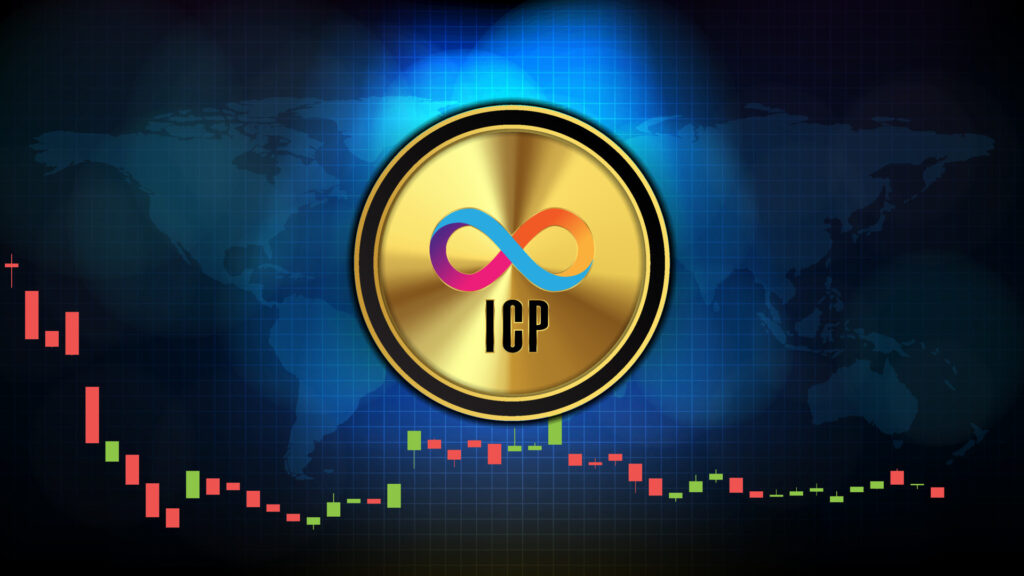Internet Computer (Icp) Price Today, Charts

The Internet Computer (ICP) is a blockchain network that aims to provide a decentralized alternative to the centralized cloud computing platforms offered by companies like Amazon Web Services (AWS) and Google Cloud Platform (GCP). The ICP network is powered by the native token ICP, which is used to pay for transactions on the network and to reward network participants for their contributions.
Key features of the Internet Computer include
- Decentralization: The ICP network is distributed across a global network of independent data centers, which makes it censorship-resistant and resilient to outages.
- Compute power: The ICP network is able to provide a significant amount of compute power, which makes it suitable for running demanding applications.
- Security: The ICP network is secured using cryptography, which makes it safe from unauthorized access.
- Scalability: The ICP network is designed to be scalable, which means that it can accommodate a growing number of users and applications.
Potential use cases for the Internet Computer include:
- Web hosting: The ICP network could be used to host websites and applications, which would provide a more decentralized and censorship-resistant alternative to the current centralized web hosting industry.
- Data storage: The ICP network could be used to store data, which would provide a more secure and private alternative to the current centralized cloud storage providers.
- Cloud computing: The ICP network could be used to provide cloud computing services, which would provide a more decentralized and cost-effective alternative to the current centralized cloud computing providers.
Overall, the Internet Computer is a promising new technology that has the potential to revolutionize the way we use the internet. However, it is still a relatively new project, and there are some challenges that it will need to overcome in order to achieve widespread adoption.
Here are some of the challenges that the Internet Computer faces:
- Complexity: The Internet Computer is a complex technology, and it may be difficult for developers to learn how to build applications on it.
- Scalability: The Internet Computer is still under development, and it is not yet clear how scalable it will be in the long term.
- Competition: The Internet Computer faces competition from other blockchain networks, such as Ethereum and Solana.
Despite these challenges, the Internet Computer is a promising project with the potential to make a significant impact on the internet. It will be interesting to see how the project develops in the years to come.
How does Internet Computer (ICP) work?
The Internet Computer is a decentralized blockchain network that aims to host the entire internet. It is a revolutionary project that has the potential to change the way we interact with the internet.
Here is a simplified overview of how the Internet Computer works:
-
Decentralized Network: The Internet Computer is a decentralized network of independent computers that are spread around the world. These computers are called nodes and they are responsible for storing and processing data on the network.
-
Canisters: Canisters are the basic unit of computation on the Internet Computer. They are essentially smart contracts that can be used to build and run decentralized applications.
-
Cycles: Cycles are the currency of the Internet Computer. They are used to pay for the computational resources that are used to run canisters.
-
Consensus Mechanism: The Internet Computer uses a consensus mechanism called Threshold Relay. This consensus mechanism ensures that all nodes in the network agree on the state of the network.
-
Governance: The Internet Computer is governed by a decentralized autonomous organization (DAO) called the Network Nervous System (NNS). The NNS is responsible for making decisions about the future of the network, such as how to allocate funds and how to upgrade the protocol.
Here is a more detailed explanation of how the Internet Computer works:
Canisters
Canisters are the basic unit of computation on the Internet Computer. They are essentially smart contracts that can be used to build and run decentralized applications. Canisters are isolated from each other, which means that they cannot interfere with each other’s operation. This makes them very secure and reliable.
Canisters are stored on the nodes of the Internet Computer network. Each node can store a limited number of canisters. When a canister is created, it is assigned to a random node. The canister is then replicated across multiple nodes to ensure that it is always available.
Cycles
Cycles are the currency of the Internet Computer. They are used to pay for the computational resources that are used to run canisters. Cycles are created by burning ICP tokens. When a canister is run, it consumes cycles. The number of cycles that a canister consumes depends on the amount of computation that it performs.
Consensus Mechanism
The Internet Computer uses a consensus mechanism called Threshold Relay. This consensus mechanism ensures that all nodes in the network agree on the state of the network. Threshold Relay is a type of Proof of Stake (PoS) consensus mechanism. In a PoS consensus mechanism, nodes are chosen to validate transactions based on the amount of stake they have in the network.
ALSO READ: Apr Vs. Apy: What’s The Difference?
Threshold Relay works by dividing the nodes in the network into subnets. Each subnet is responsible for validating a subset of transactions. When a transaction is submitted to the network, it is broadcast to all of the nodes in the network. The nodes in each subnet then vote on whether or not to validate the transaction. If a majority of the nodes in a subnet vote to validate the transaction, then the transaction is considered to be valid and is added to the blockchain.
Governance
The Internet Computer is governed by a decentralized autonomous organization (DAO) called the Network Nervous System (NNS). The NNS is responsible for making decisions about the future of the network, such as how to allocate funds and how to upgrade the protocol.
The NNS is made up of ICP token holders. ICP token holders can vote on proposals that are submitted to the NNS. The proposals with the most votes are implemented.
Benefits of the Internet Computer
- Decentralization: The Internet Computer is a decentralized network, which means that it is not controlled by any single entity. This makes it more resistant to censorship and other forms of attack.
- Security: The Internet Computer is a very secure network. Canisters are isolated from each other, which means that they cannot interfere with each other’s operation. This makes them very secure and reliable.
- Scalability: The Internet Computer is a very scalable network. It can handle a large number of users and applications without any problems.
Challenges of the Internet Computer
- Adoption: The Internet Computer is still a relatively new technology and it has not yet been widely adopted. This means that it is not yet as widely used as traditional internet infrastructure.
- Complexity: The Internet Computer is a complex technology and it can be difficult to understand and use. This means that it may be difficult to attract developers to build applications on the network.
Conclusion
The Internet Computer is a revolutionary project that has the potential to change the way we interact with the internet. It is a decentralized, secure, and scalable network that can handle a large number of users and applications. However, the Internet Computer is still a relatively new technology and it faces a number of challenges, such as adoption and complexity.







